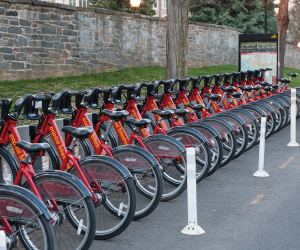
A series of bicycle-focused measures spearheaded by students and the Georgetown University Police Department aims to foster the biking culture on campus. However, plans for a university bike share have reached a stalling point.
The Georgetown University Office of Sustainability is working in collaboration with GUPD to inspect bicycles on campus, tagging for removal those that appear to be abandoned.
On April 9, three GUPD officers and three student volunteers tagged over 90 bicycles on campus that met the appropriate criteria as “abandoned.” Such criteria included rusted chains, flat tires and bent wheels. If unclaimed by April 16, the tagged bicycles will be removed and held by GUPD for 90 days. After this time period, any unclaimed will be donated to Bikes for the World, a charity that provides fixed bicycles to those in need.
In a university-wide email sent April 9, Chief of Police Jay Gruber stated that the purpose of the initiative is “to promote a bicycle-friendly campus, promote safety and protect property on campus.”
According to Joseph Smith, the deputy chief and associate director of GUPD, there have been three similar bike-tagging projects at Georgetown in the last five years, all of which successfully created space for active riders on campus while simultaneously serving as a crime deterrent.
Greg Miller (SFS ’14), a sustainability research fellow, stated that the lack of air pumps and bicycle repair resources available on campus forced students to stop riding. Additionally, many bikes are left in disrepair when students graduate, creating a buildup of broken and abandoned bikes.
Miller has worked closely with the university on additional bicycle initiatives throughout the year. Most recently, he helped bring a free full-service bike repair stand to Red Square. The stand was donated by The Bike House D.C., a local bike co-op, with the Georgetown University Student Association funding its installation. The program might see further expansion if it proves to be a success.
“The bike repair stand is designed to be outside and withstand the elements, and thus should not require regular maintenance,” Miller said. “It has an air pump and all the basic tools that someone would need to keep their bike in good condition.”
In addition to the abandoned bike project and the repair stand, Miller has also recently helped Georgetown become a certified Bicycle Friendly University after submitting an application to the League of American Bicyclists. Georgetown is the first school in Washington, D.C., to earn this recognition.
With the growing popularity of student-owned bicycles on campus and the award from the League of American Bicyclists, university administrators have begun to provide more support to the issue.
GUPD offers a bicycle registration service where students, faculty and staff can officially register their bikes with the university, allowing the department to keep track of bicycle issues and thefts.
“Based on a count done this past fall for our parking report, there were about 630 bikes parked on campus during peak occupancy during the day,” Miller said.
According to Deputy Chief Smith, only 13 students are currently registered in the system. DPS hopes this number will increase thanks to the raised awareness of campus cycles.
Miller hoped for his final project to bring a university bike share to campus in his last semester with former GUSA Secretary of Sustainability Gabe Pincus (SFS ’14), but the program has been put on hold with the two seniors’ impending graduation.
The original vision for the program included hourly bicycle rentals, similar to the Capital Bikeshare program outside the front gates. Eventually, it evolved into a semester-based rental system to best serve the students and increase space on campus for bicycle storage.
“For some rental fee, we would provide a bike, a lock and lights, and [students] could take the bike for the entire semester and use it at their convenience,” Miller said.
The two leaders of the initiative are searching for underclassmen who express interest in continuing the project but have been unsuccessful.
“We still have a long way to go to make Georgetown really bike-friendly,” Miller said. “But I am confident that with some demonstrated support of the administration for bicycling programs, it will become a mode of transit that more people consider and use.”















Jacques Arsenault (@jarsenault) • Apr 15, 2014 at 2:15 pm
As a Georgetown alum (C’01, MPP’07), a neighbor, and a regular bicyclist, I am thrilled to see the strides that Hoyas are taking to make the university a more bicycle-friendly campus. I would strongly encourage the students leading this effort, though, to push for more Capital Bikeshare stations on and around campus–as was, I believe, committed to in the agreement with the neighborhood for the last Campus Plan–rather than trying to create an alternative bike-sharing program.
More Capital Bikeshare stations, in places like 37th and Reservoir, 36th and Prospect, Outside Leo’s or the new Healey Family Student Center, and Leavey, would transform the way that students connect with the community and the District as a whole, in addition to providing easy ways to make short trips on or near campus. These stations would tie into a network of more than 315 stations in the region, with easy access to countless destinations. And if there was money available, the university could subsidize annual memberships for students, making the $75 annual membership even more affordable.